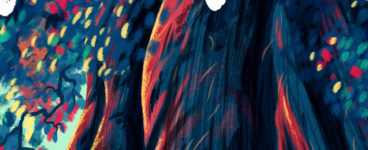‘When you’re safely ensconced in a bubble, you are in a comfort zone.’
Love: An Archaeology collects fourteen stories from science fiction to weird, mixing future scenarios and alternate realities. No matter their location, they feature love and its malcontents at the core. You can read an excerpt of ‘The Emptiness in the Heart of All Things’ below.
Extract taken from Love: An Archaeology
By Fabio Fernandes
Published by Luna Press Publishing
The Emptiness in the Heart of All Things
The house in the middle of the forest was just that: a house. Neither a mansion nor a shack. Just a house. From a distance Anita could see two of the four walls, brickwork covered in plaster and what seemed to be a recently applied coat of white paint. Also a red roof made from simple baked clay tiles, just steep enough for the rainwater to slide down. It’s too hot for snow in the jungle, but it rains a lot.
No, scratch that, Anita thought to herself. It’s the sertão, not the jungle.
She should know better: she lived in Manaus, at the heart of the Brazilian rainforest. A huge city in the edge of the Amazon, pretty much surrounded by real jungle, a stifling hot mess of huge clumps of trees with thick vines entangled all over, so dense at some points that you couldn’t slash your way with a machete unless you were a native—and natives usually don’t need machetes. This was different: mostly sparse trees and ankle-deep shrubs, rather easier to walk through.
Now—after traveling four thousand kilometres by plane (from Manaus to Belo Horizonte, then from BH to Montes Claros, upstate Minas Gerais) and by boat up the river São Francisco (from Montes Claros to the small town of Buritizeiro, plus 86 kilometres), then forty minutes by jeep through a rough patch of dirt road. The driver dropped her at the edge of the forest and told her to walk westward for about ten minutes. The sun wouldn’t set for a couple of hours, but it wasn’t too hot for the tropical autumn. In fact, she could feel a light breeze, almost cold, touching her skin. She felt good.
After twenty minutes instead of the promised ten (Be more specific, Anita made a mental note to tell the driver when she got back), she arrived at a clearing, right in front of a wooden porch. Sitting at the top stair, an older woman smoked a cigarette.
Not very old, though. The few online sources about her weren’t accurate. Some gave her sixty-five, some seventy; one even gave her eighty, which, now she saw, was absurd. And definitely not ugly as Anita was given to understand. On the contrary: her tanned skin seemed that of a young person, but as she approached, Anita could see the small, half-hidden, almost apologetic folds of sagging flesh under the arms and chin. She had a glorious mane of white hair which contrasted beautifully with the brownish tone of her sun-drenched face.
But Anita was raised Catholic, and she understood that not every monster was necessarily repulsive to the eye.
In fact, the devil was above all things a creature of seduction. And, even if she didn’t necessarily believe in God, she believed in the Adversary.
Anita armed herself with her best smile and approached, waving.
“Miss Barbosa?” she said, stepping out of the shrubs.
The older woman didn’t seem startled by the sudden appearance. She just stared silently at her and took a deep drag on her cigarette. Then, blowing the smoke, she nodded.
“In the flesh,” she gave a tired smile. She didn’t offer her hand; instead, she pointed with her cigarette—a shoddy handmade thing, exhaling an acrid smoke—for Anita to sit there beside her. Anita dropped her backpack at the end of the stairs and did that.
“Was it hard to find the house?”
“A bit longer than the driver told me, but no, it wasn’t.”
“Distances can be deceptive here.” She put out the cigarette in the wooden handrail at her side and stood up. “Come on in. I just brewed a pot of fresh coffee.”
*
Inside, everything was neat and tidy. Smack in the middle of the room, an old black iron stove sat there, hot with firewood smouldering in it. A huge black pipe darted from behind the stove, all the way through the roof. On the cooktop, an old, battered coffee pot. By the opposite wall, Anita saw a small Formica table cluttered with books, and two wooden stools, the whole set on the top of a thin red rug. To the left, two doors. Between them, a bookshelf heavily laden with paperbacks.
“Had a good trip?” the old woman asked Anita as she poured coffee into an old, dark blue enamel mug. After a couple of days having atrocious coffee in airports and bus stations, the brew smelled heavenly.
“I did, thanks.”
“For me, the worst is the plane trip. I enjoy flying, but not like that.”
“Yes, the turbulence midway is awful. Everybody told me to avoid traveling here on a full stomach.”
The woman smiled.
“How do you want to do this?”
“Do you mind if I record the interview, Miss Barbosa?”
“No. And call me Elizabeth.”
They sat on the stools. Anita took a long sip of the coffee. It was really delicious. She looked for a place at the table for the mug, but there were just too many books piled there (good, neat, evenly spaced piles, she noted). Slowly, she put her mug on the floor, taking care not to set it on the red rug, which, upon close examination, seemed more a pinkish rag, clean but very old and treaded on by many feet and shoes. She took a finger-sized stick out of her jeans pocket, pressed a button and checked the tiny screen. Then she placed the stick on top of one of the book piles.
“Miss Barbosa, why are you here?” Anita asked.
“Are you sure this will work from that distance?” Miss Barbosa pointed to the small recorder. “And call me Elizabeth, please. I hate formalities.”
Anita smiled. “Ok. The recorder will work fine, don’t worry.”
“I’m not worried,” Elizabeth shrugged. She sipped from her mug and started talking. “It wasn’t a big deal in the beginning. Very early in my life I learned to live with the unexpected. My mum used to say that things never happen the way you expect them to—but they often come out better than you might imagine.”
“You only published two books,” Anita said. “A novel and an essay. None of them have anything to do with… here.”
“That is not true,” Elizabeth said. “Did you read my essay?”
“Yes.” Anita had done her homework. “It was a very interesting take on Camus’ The Myth of Sisyphus.”
“Not only that,” Elizabeth countered. “It was an evolution of the concept, so to speak, regarding the ethical eye of the beholder. Camus assumes the burden of Sisyphus can’t be removed from him, and that must account for something, so he ponders that Sisyphus strives to become a better man by sheer effort of will, accepting his fate. First I tried to analyse this at the light of Buddhism, which makes sense, but only if you want to agree with Camus all the way. I always thought that somehow the old Algerian was being ironic. The ultimate existentialist, maybe.”
“Yes, and that’s the part I didn’t really get. You seemed to make the point that the rock is not a rock, just the dark side of Sisyphus.”
“Not the dark side. The rock is his shadow. Are you familiar with the Jungian term?”
This homework Anita hadn’t done. She shook her head.
“That’s all right. Nobody these days is very familiar with Jung. Or even Camus. I’m surprised you came all the way down south just to interview me about it.”
“I just want to understand you. It’s hard for me to understand how you could have dropped everything in your life to live here.”
“You say here like it is a bad word. I suppose young people always think their way is best.” Elizabeth sipped her coffee. “Maybe it is, but that’s what you are. I’m cut of a different cloth. Maybe it’s my age, the way I was raised. Anyway, one day I woke up and found out that I didn’t really have anything to lose. I had lost my family long ago due to my… proclivities, as we used to say then. And what are material things after all? I was tired of living in a bubble.”
“But you lived in São Paulo. One of the biggest cities on Earth. A megalopolis.”
“And a bubble nevertheless. Just a very big one.”
“But why here? And by here, I didn’t mean anything nasty. Sorry if I didn’t make myself clear.”
“Here’s the thing,” Elizabeth carried on, as if she hadn’t heard Anita’s apologies, or hadn’t cared. “When you’re safely ensconced in a bubble, you are in a comfort zone. Inside this zone, you only see and hear what you want to. You learn not to hear police sirens in the middle of the night, or junkies shouting in pain, or a woman crying “thief” or “rape.” You manage to convince yourself that you don’t have anything to do with all of that, and that’s all right, because it’s a coping mechanism, it’s how you live without getting crazy. Or without getting too crazy, at least.
“I decided to move here because I could live a quieter life. And because I could face my shadow. My other half. The one that screams bloody murder, literally.”
Having said that, she suddenly stopped talking. But this brusque pause didn’t seem to be for dramatic effect. Instead, she got up and went over to the stove.
“What is this interview for, again? I’m sure you told me in your e-mail, but I honestly can’t remember, sorry.”
Anita almost felt sorry too. But she was used to being questioned. And she was sure that was the case now too.
“It’s for my doctorate thesis on forgotten Brazilian female writers,” she told her the cover story. “I already profiled the other living writers on my list. You are the last one.”
Elizabeth laughed out loud.
“Good to know I’m a living writer,” she said. “For a second you had me confused.”
“I didn’t mean to—”
“Nah, I’m being facetious. Are you hungry? Let’s have some dinner, shall we? It’ll be dark soon, and we sleep early in the wilderness.”
*
Love: An Archaeology by Fabio Fernandes is published by Luna Press Publishing, priced £9.99
ALSO IN THIS ISSUE

 The Fair Botanists: Interview with Sara Sheridan
The Fair Botanists: Interview with Sara Sheridan
‘For me the fascination is always in asking the question: where do we come from?’














